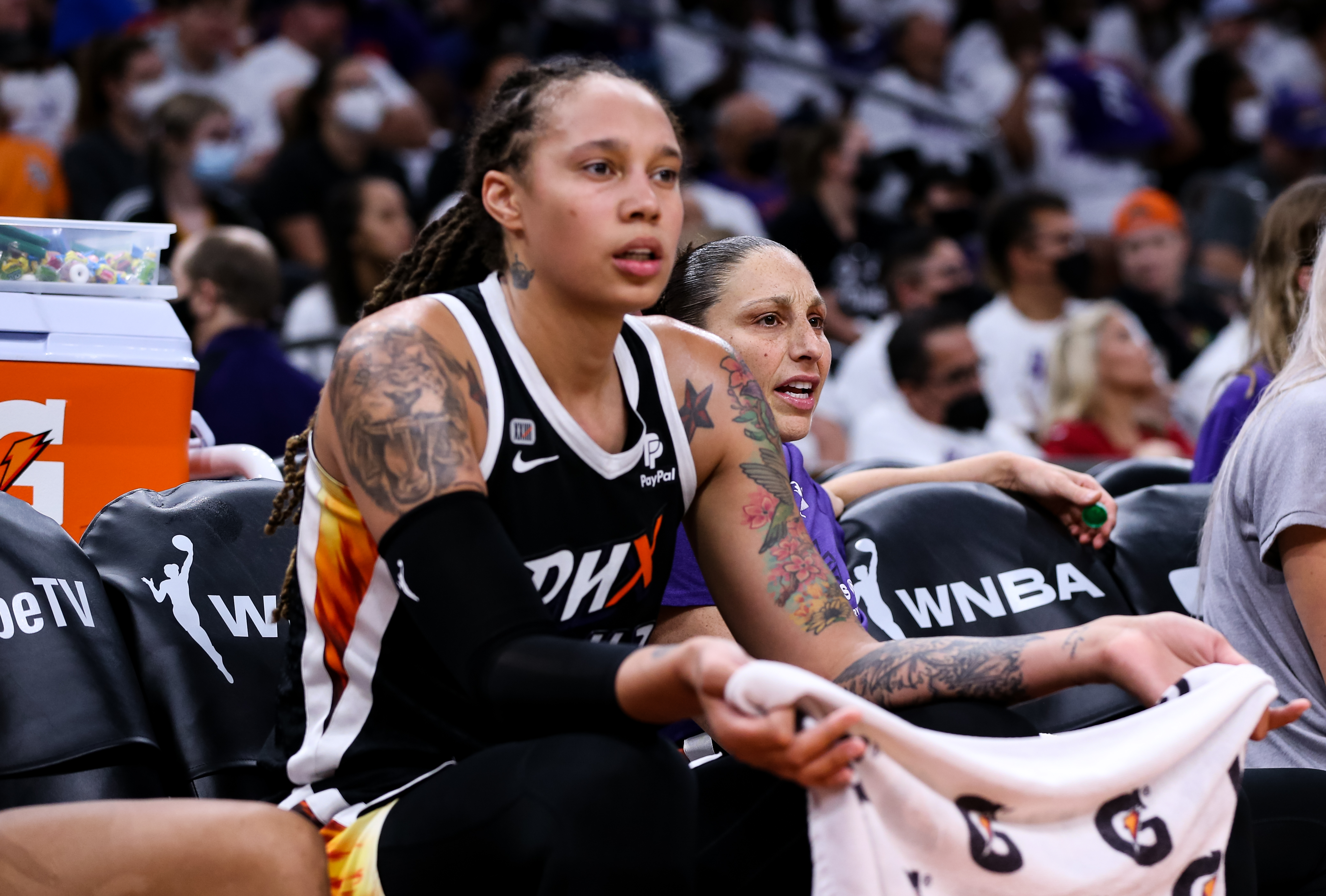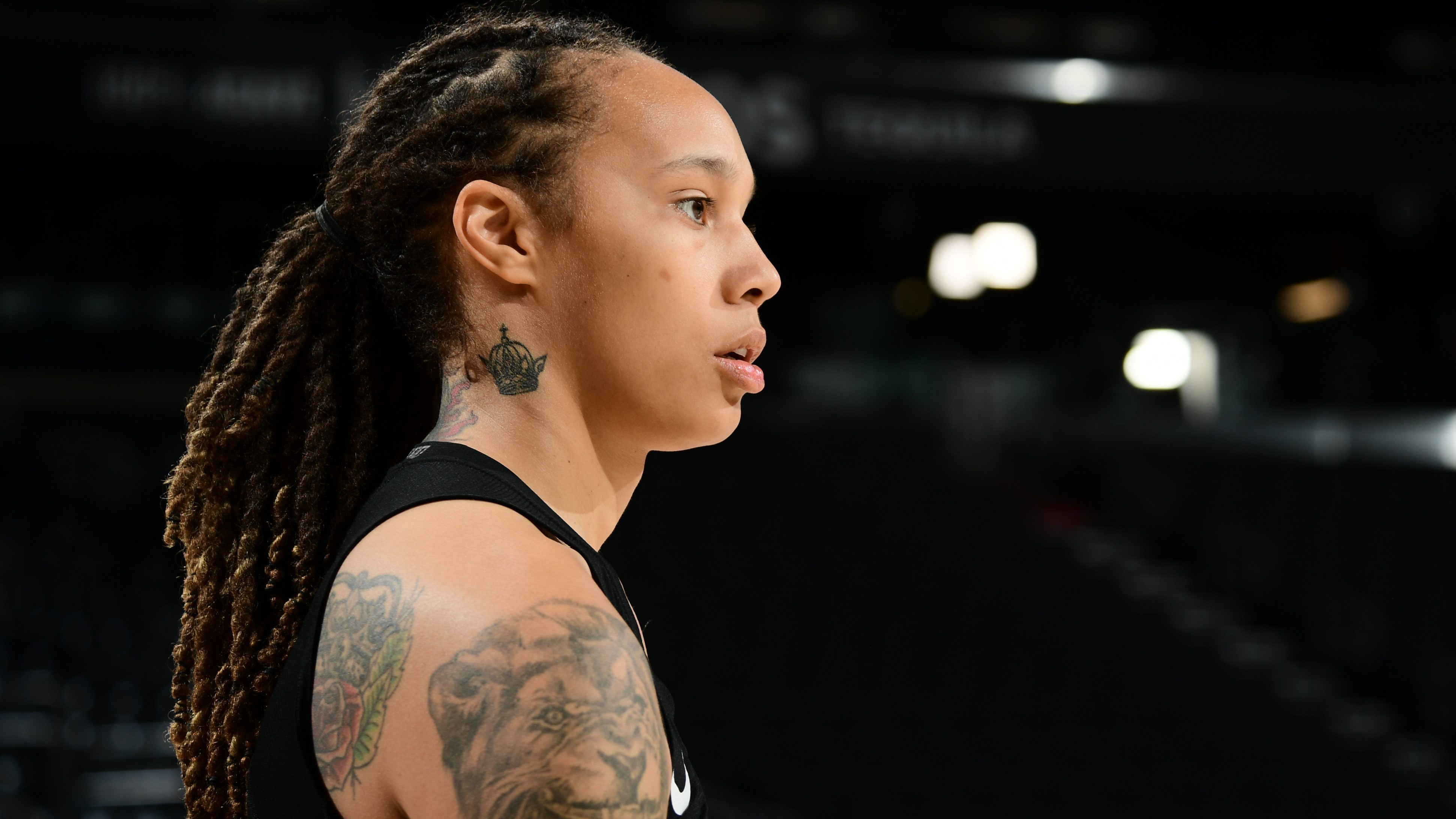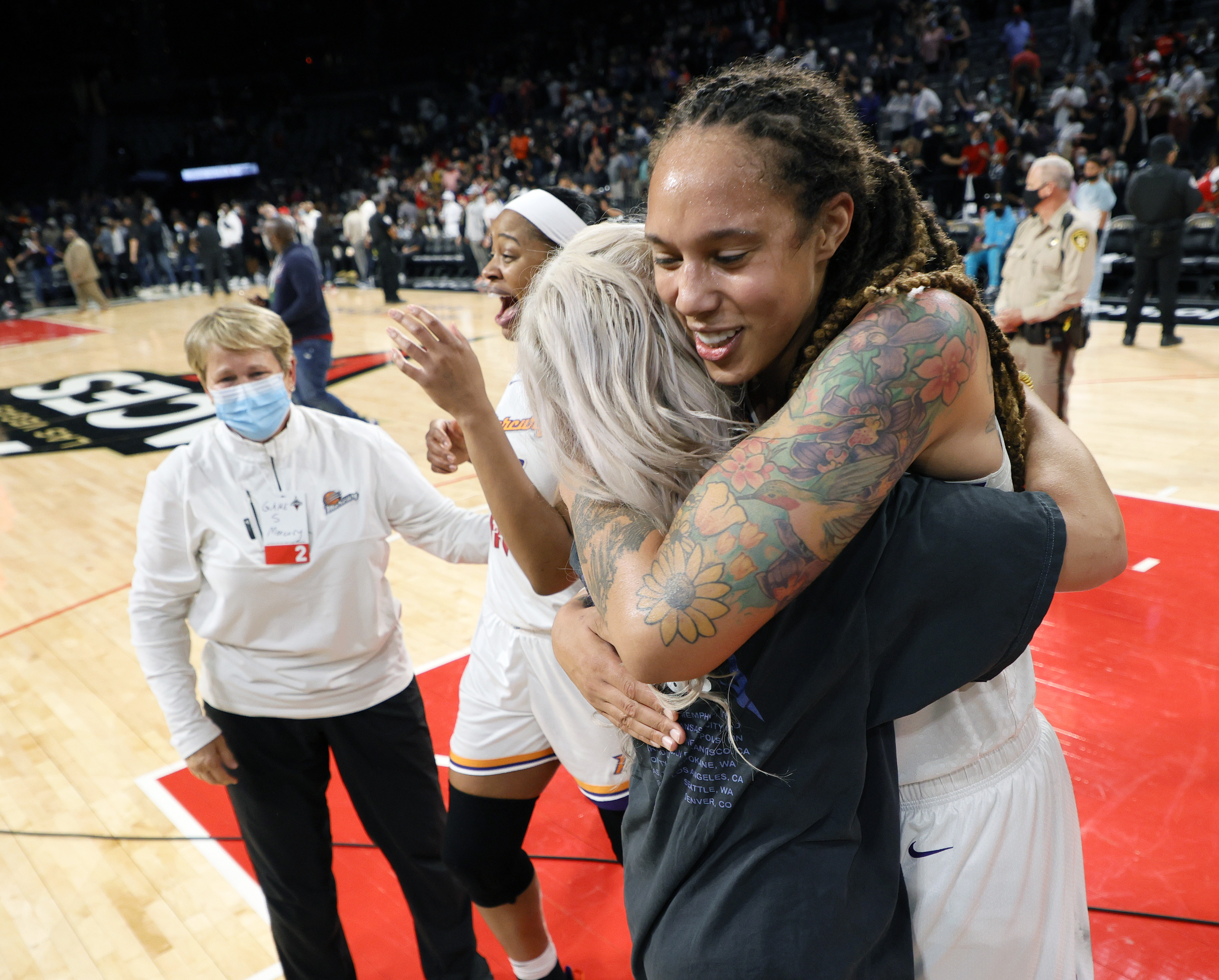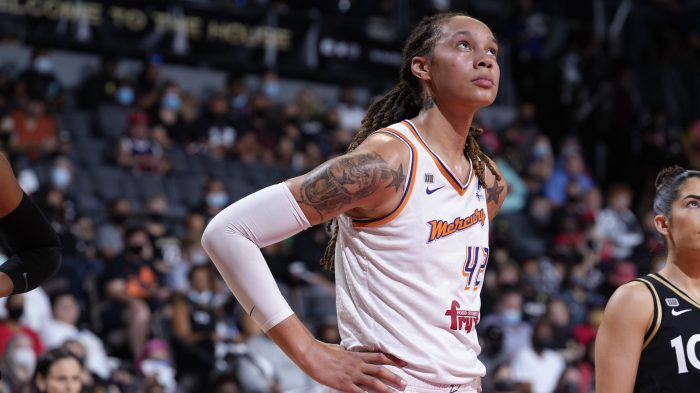After 294 days of being detained by the Russian government, Olympic champion and Phoenix Mercury star center Brittney Griner has been released and is back in the United States.
It was announced early Thursday morning that the United States and Russia had agreed to a prisoner swap leading to the release of Griner in exchange for Viktor Bout, a Russian arms dealer. Griner’s plane landed in San Antonio early Friday.
“Today my family is whole,” said Cherelle Griner, Brittney Griner’s wife.
Griner’s return ends a tumultuous series of events that began in February when Griner, en route to begin a basketball season overseas with her longtime Russian team UMMC Ekaterinburg, was detained by officials at a Moscow airport after vape cartridges containing hashish oil were found in her luggage. Griner was charged with drug smuggling and after a trial, was convicted in July. She was sentenced to nine years in prison. The WNBA honored Griner the entire 2022 season. Former U.S. women’s national team head coach Dawn Staley, and others, advocated for her release on social media almost daily. Griner was transferred to a Russian penal colony in November.
Now back in the U.S., Griner – a Black woman and member of the LGBTQ+ community who has long been one of the most recognizable players in women’s basketball at the collegiate and professional levels – will begin a potentially arduous journey of recovering and healing from her traumatic experience of detainment in Russia.
Andscape spoke with medical experts who specialize in trauma and trauma recovery about Griner’s recovery and the importance of the support she will need from her community and inner circle during the process.
These interviews took place in August.
Can you classify Griner’s trauma just based on the facts that we know about her situation?
Samantha Ludin, clinical psychologist, clinical assistant professor, psychiatry and behavioral sciences at Stanford University: What we certainly know more broadly in the field is the experience of arrest can be in and of itself a trauma. The experience of detainment and isolation has been found to be associated with complex trauma and complex PTSD [post-traumatic stress disorder] as well as depression and anxiety and that, generally speaking, any acute fear and hopelessness as well as uncertainty loads on to pretty profound stress for a lot of folks. In other situations for people who are political detainees, who are prisoners of war, who are experiencing detainment because of their refugee status, people from these different populations often experience trauma from different elements of their detainment. And it’s certainly possible, and we can probably say plausible, that Brittney Griner is experiencing some version of this.
What are some of the immediate first steps Griner might take in beginning to recover from the trauma she has endured? What are the biggest hurdles Griner will face in the beginning of her recovery?
Impossible to say. People’s responses to trauma are variable. The majority of folks that experience trauma do not go on to develop significant diagnostic level disorder in response. The majority of people who experience traumatic events heal in a way that we might describe in literature as ‘naturally.’ The severity of the trauma does not necessarily load on to the type of treatment they might require and what eventually develops for them and their mental health. Rather, it’s a clustering of different experiences at that given time and where they are emotionally and what happened in the trauma and how it all came together and overlapped and intersected.
Generally speaking, when people have very recently experienced a trauma, you really want to over the first few weeks in the recovery almost create more space for them to simply settle, to see what perhaps are some acute symptoms that come directly following a trauma. We really talk about trying to return to normalcy as much as possible. That means connecting with your communities as much as possible and really receiving as much social support as you can. It also might say going back to your routine, the extent that that is possible and really trying to acclimate your life again in a way that you have access to.
In those first few weeks, you’re really encouraging people to have some patience with their own health and allowing themselves to go through a natural healing process in which eventually they are going to notice perhaps less acuity of symptoms. After two weeks, maybe a little longer, you have a greater sense of what they still have to sort through and what they might need help processing. At that point is when you might say it makes sense to do an evaluation to see where they are experiencing distress, where they think [different types of]therapy might be useful and that point begin to evaluate for treatment recommendations.
The hectic final chapter to Brittney Griner’s time in RussiaRead now
What role does social support play during the recovery process and what is expected from those who will be active participants in Griner’s social support circle?
That’s a really good question and a hard one for anybody. I would say that what we know to be true in the literature is that it’s not the social support that is important but rather their perception of social support, which is a really fine-tuned nuance. Essentially what it means is that after experiencing any kind of trauma, people’s cognitions can change really significantly and their understanding of their world can be really altered. You can have an extraordinary support system with a huge community that’s ready to rally around you, but if you are not in a place where you can take in that support, you can receive all of those people showing up for you, then it doesn’t matter what they do. You are not going to experience the benefits of that.
It’s important to note that people are not responsible for their loved one’s trauma or recovery. You can show up beautifully, but it really depends on where someone is, if they can have access to it. In the case that she was in a place emotionally and psychologically where she was able to perceive social support, then it could have an enormous impact and be really helpful. Generally, what we’re looking for from support systems, from friends and family, and community following trauma is that they create space to validate someone’s experience. They create space to provide time to process verbally and to help the person integrate what happened to them into a coherent narrative and to make sense of what happened in their life. Social support who are really helpful are the ones who say I am here to talk, I am here to listen. They are the ones who are not necessarily creating a sense that somebody’s traumatic experiences — whether it’s their emotions or stories about their trauma — are a burden. They are not people who are saying don’t think about that anymore, you’re gone, but rather saying let’s talk about it as much as is useful to you. And ultimately, social support systems that encourage folks to seek therapy, to reach out to more resources …. that really support the traumatized person in seeking out the professional resources they need. That’s really what we’re looking for.
 Phoenix Mercury center Brittney Griner reacts to a foul call in the second half during the game against the Chicago Sky at Footprint Center on Oct. 10, 2021, in Phoenix.
Phoenix Mercury center Brittney Griner reacts to a foul call in the second half during the game against the Chicago Sky at Footprint Center on Oct. 10, 2021, in Phoenix.
Mike Mattina/Getty Images
Kip Thompson, clinical researcher in the PTSD Research and Treatment Program at the New York State Psychiatric Institute: When I was in graduate school, my master’s thesis was on Hurricane Katrina. I had a sample of people who were evacuated from New Orleans to Columbia, South Carolina. I had a sample of people who were able to stay on the Gulf Coast. The Black women, regardless of where I found them, whether in New Orleans or Columbia, had extreme deficits in social support. They were responsible for taking care of their families. They were responsible for evacuating. There were very few people around them individually who made them feel supported who they could trust. Brittney Griner is going through her own personal Hurricane Katrina.
When she gets out, she will need support, but she will also need all the relationships and connections she has in her world, she’s going to need those to be reinforced. Her wife, … teammates, fans, the WNBA leadership, the people Brittney has close relationships with, the companies she has endorsements with, all these people are really going to have to surround her with support and non-judgment and really showing her love. The situation is difficult. … The people in her inner circle are really going to have to make a concerted effort and let her know that they are not judging her and show her the camaraderie and loyalty and respect that she deserves as a human being.
Dr. Thompson, you said Griner is experiencing her own personal Hurricane Katrina. What are the most pervasive challenges for folks like those who endured Hurricane Katrina, now years removed from that traumatic experience?
There are all these microtraumas that follow the bigger trauma. When I think about Brittney Griner, she’s going through her big trauma right now, still unfolding. When she comes home, trust and believe there will be microtraumas that follow her. She probably will deal with fans who don’t think she should’ve come back home. People who think she should’ve stayed in Russia. That, I imagine, would be really upsetting for her. On the news, the talk show circuit, you know how people want to go in for a thrill, someone is going to jump up and say well why did you do XYZ? When she’s forced to talk about her own experiences and it’s not on her own time or in her own way, that’s going to be a microtrauma. It’s going to force her to live and also force her to dissect her decision-making.
When I think about her being in her own Hurricane Katrina, it’s like this is an event she is never going to be able to forget, but the people around her are going to determine how well she moves past it. If they are supportive, then she’ll be able to get on that equilibrium faster. If they’re not, trust and believe Western society is going to come in and they are going to try and pick her bones clean because we’ve got too many geopolitical things going on right now anyways to ignore what this situation has created. People have their own kind of opinions and stuff and she is going to have to be dealing with that for weeks, months and years into the future. Her inner circle — friends, family, fans, partner, bosses, all the people she works with on a regular basis, I hope she takes an inventory of those people when she gets back and finds who are the people that really support her who she can trust, because she will need it.
 Brittney Griner, the WNBA and placing a higher value on female athletesRead now
Brittney Griner, the WNBA and placing a higher value on female athletesRead now
This process has impacted so many in the WNBA community, many of whom are close to Griner. What kind of toll does undergoing this experience, and being in proximity to someone who has experienced this trauma, have on the immediate communities that will be tasked with being that social support upon Griner’s return?
Ludin: It can be a really heavy process to sit with someone who has experienced trauma. As a caregiver and provider of support, it can weigh pretty heavily on folks for different reasons — whether it’s because you are the person that is showing up and is being taken up on the offer to sit and talk, it can be really traumatizing to hear and witness the effect of somebody else’s trauma. We see that all the time with first responders who witness trauma or secondary trauma, as we might call it. The experience of providing aid and support can be a hard one and often we recommend that folks that are in that position seek out their own supportive therapy so that they have a way to also offload and process some of their own stress and anxiety as well as their own feelings of grief or sadness or anger that might come up from the situation and helplessness they might feel.
In terms of the effects somebody might feel if they are really wanting to be able to help and provide aid and they don’t feel like they are able to for whatever reason, whether it’s because the person that has been traumatized at that moment can’t receive it or maybe it’s overwhelming — maybe they’re feeling really isolated and it’s not going to work for them to have a lot of folks present — again, seeking out therapy focused on helping them work through feelings of hopelessness, helping them work through frustration and anger — their own grief process — is really what we recommend. That is possible here.
How does Brittney Griner’s identity, and the fact that she is a part of many marginalized communities impact her experience with trauma and ultimately her recovery?
Thompson: You have to look at it with an intersectional lens. First and foremost, she is a woman. She is African American. She is LGBTQ and she’s also a celebrity. Each one of those identities confers upon it a different set of challenges and strengths and resources. What that means is that each of those identities, because they are all kind of different, they’re all intersecting in one person and making her experience different than it would have been if this was about LeBron James, Larry Bird or Hope Solo.
In her case, because she is a Black woman who is LGBTQ in a country that is notoriously not supportive of people with those kinds of identities, I think that she will need people who demonstrate an understanding of that and who are also in tune to the unique needs of women, the unique needs of Black people, the unique needs of LGBTQ people and people who also understand what it’s like to be in the public eye. I think that all of those things are important when discussing Ms. Griner but also considering what she’ll need and how to be a support to her. She’s not just a WNBA player, she’s not just a woman. She’s also Black, she’s also lesbian, she’s also multiple other things and all of those things are going to be brought in the therapy room to help her demonstrate resilience after all of this.
In 2020, Griner had to leave the WNBA season’s remote bubble for personal reasons and later said she sought treatment for mental health following her departure. Does sustaining trauma, like Griner has in Russia, have a larger psychological impact on individuals like Griner?
Ludin: There are two paths that could take with anyone. On the one hand, the literature is pretty clear – having prior experiences with mental health distress of any kind, whether we might say that is some kind of adjustment to stress or in Brittney Griner’s case when she left the bubble, finding that she needed some counseling as well as other things to cope with what was going on in her life. These experiences certainly seem to be associated with having a more intense response to trauma and at times that can simply mean just heightened distress and other times that can be associated with acute stress disorder or later developed to PTSD. There is certainly a pretty clear connection between that.
On the other hand, and I think it’s really worthy of noting, one of the strongest indicators that somebody is not going to go on to develop PTSD or acute stress disorder is their capacity to seek out help both from their social support as well as professionals to cope with the trauma they’ve experienced. While on the one hand we could say yes, absolutely that anyone that has previously sought out treatment for mental health reasons would be more likely to develop trauma symptoms, we could also just as easily say, and I think it’s fair to say, that that person probably has a variety of resilience factors that people that have not previously encountered mental health services wouldn’t have access to.
 Phoenix Mercury center Brittney Griner embraces Ann Meyers-Drysdale, vice president of the Phoenix Suns and the Phoenix Mercury and broadcaster of the Mercury, after the Mercury defeated the Las Vegas Aces 87-84 in Game 5 of the 2021 WNBA playoffs semifinals Oct. 8, 2021, in Las Vegas.
Phoenix Mercury center Brittney Griner embraces Ann Meyers-Drysdale, vice president of the Phoenix Suns and the Phoenix Mercury and broadcaster of the Mercury, after the Mercury defeated the Las Vegas Aces 87-84 in Game 5 of the 2021 WNBA playoffs semifinals Oct. 8, 2021, in Las Vegas.
Ethan Miller/Getty Images
What kind of role could basketball play in recovery should Griner choose to make it a part of her recovery?
Ludin: I think it’s going to really depend. I think on the one hand, for some high-performance athletes, the experience of being an athlete is such a grounded part of their identity that returning to the sport can actually be extremely soothing to their physiological system. It can be very emotionally helpful. It could be a space where they process — they’re sort of able to return to who they really are. In this case, where there is also the component that she was detained while in Russia playing, it’s also very possible that basketball represents a trigger and might be challenging to return to.
While very rarely would a psychologist recommend that somebody engage in avoidance of a trigger, if it were to be something that caused heightened distress or anxiety, it’s likely there’d be a recommendation that with a professional she begin to reenter that space rather than just jumping back in. I think the other piece is stress and feeling a great sense of pressure and responsibility to others. It’s an activating experience. It can be one that could make someone feel really lonely, feel really alienated from themselves.
What should the expectations be for the general public, who are so used to seeing Brittney Griner in the public eye as a public figure, upon Griner’s return?
Ludin: It’s hard to speak to what the public should do, especially in this world of such high demand in place for those in the public eye, and not knowing how she is going to return and what would be most beneficial to her. Generally speaking, I’d say that after trauma, people should take their cues from the person who experienced the trauma. In this case what that might look like is really respecting boundaries set by Brittney Griner, her family, her wife, her team – really taking the cue from what makes the most sense for her and her treatment. If that means speaking about her trauma and her detainment broadly and really bringing attention to it and saying this is what I want to speak to and let everyone in on my experience, then of course taking that at face value.
Or if following her return, Brittney Griner’s team makes the decision to not do interviews, not speak broadly about this, that should be really respected. Ultimately, a person who has experienced any kind of trauma doesn’t owe anyone anything about their experience. Navigating how to best represent themselves in the broader world is one of the real struggles of therapy for anyone. Certainly, when you have this huge lens pointed at you as someone in the public eye, I would say that’s even more important to really take the cues from the people who know best. That would be the care providers or Brittney Griner herself rather than feeling pressured to be in the public eye again too quickly.
Sean Hurd is a writer for Andscape who primarily covers women’s basketball. His athletic peak came at the age of 10 when he was named camper of the week at a Josh Childress basketball camp.



